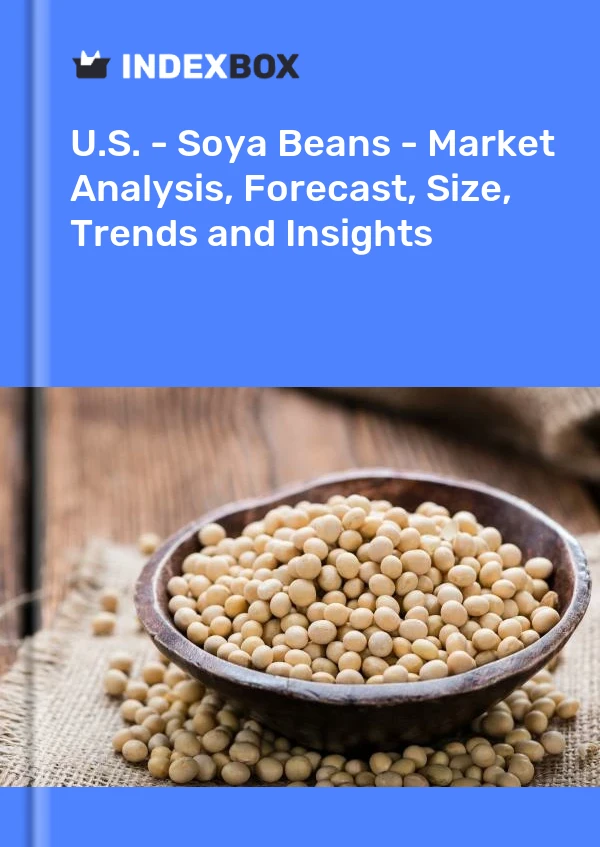
U.S. - Soya Beans - Market Analysis, Forecast, Size, Trends and Insights
Get instant access to more than 2 million reports, dashboards, and datasets on the IndexBox Platform.
View PricingProduction of Soya Bean in the United States - 2022
Contents:
- Soya Bean Production in the United States - 2022
- Soya Bean Harvested Area in the United States - 2022
- Soya Bean Yield in the United States - 2022
Soya Bean Production in the United States - 2022
In 2022, after two years of growth, there was decline in production of soya beans, when its volume decreased by -1.7% to 117M tons. In general, production showed a relatively flat trend pattern. The most prominent rate of growth was recorded in 2020 when the production volume increased by 19% against the previous year. Soya bean production peaked at 121M tons in 2018; however, from 2019 to 2022, production failed to regain momentum. Soya bean output in the United States indicated a relatively flat trend pattern, which was largely conditioned by a relatively flat trend pattern of the harvested area and a relatively flat trend pattern in yield figures.
In value terms, soya bean production dropped to $53.8B in 2022. Over the period under review, the total production indicated pronounced growth from 2017 to 2022: its value increased at an average annual rate of +2.9% over the last five years. The trend pattern, however, indicated some noticeable fluctuations being recorded throughout the analyzed period. Based on 2022 figures, production increased by +55.9% against 2019 indices. The growth pace was the most rapid in 2021 when the production volume increased by 34% against the previous year. As a result, production attained the peak level of $61.6B, and then fell in the following year.
Soya Bean Harvested Area in the United States - 2022
In 2022, the total area harvested in terms of soya beans production in the United States fell slightly to 34M ha, remaining relatively unchanged against the year before. Over the period under review, the harvested area continues to indicate a mild decrease. The growth pace was the most rapid in 2020 when the harvested area increased by 10%. Over the period under review, the harvested area dedicated to soya bean production reached the peak figure at 36M ha in 2017; however, from 2018 to 2022, the harvested area stood at a somewhat lower figure.
Soya Bean Yield in the United States - 2022
In 2022, the average yield of soya beans in the United States contracted to 3.5 tons per ha, remaining constant against 2021 figures. In general, the yield, however, recorded a relatively flat trend pattern. The most prominent rate of growth was recorded in 2020 with an increase of 7.7% against the previous year. The soya bean yield peaked at 3.5 tons per ha in 2021, and then fell in the following year.
This report provides an in-depth analysis of the soya bean market in the U.S.. Within it, you will discover the latest data on market trends and opportunities by country, consumption, production and price developments, as well as the global trade (imports and exports). The forecast exhibits the market prospects through 2030.
Product coverage:
- FCL 236 - Soybeans
Country coverage:
- United States
Data coverage:
- Market volume and value
- Per Capita consumption
- Forecast of the market dynamics in the medium term
- Trade (exports and imports) in the U.S.
- Export and import prices
- Market trends, drivers and restraints
- Key market players and their profiles
Reasons to buy this report:
- Take advantage of the latest data
- Find deeper insights into current market developments
- Discover vital success factors affecting the market
This report is designed for manufacturers, distributors, importers, and wholesalers, as well as for investors, consultants and advisors.
In this report, you can find information that helps you to make informed decisions on the following issues:
- How to diversify your business and benefit from new market opportunities
- How to load your idle production capacity
- How to boost your sales on overseas markets
- How to increase your profit margins
- How to make your supply chain more sustainable
- How to reduce your production and supply chain costs
- How to outsource production to other countries
- How to prepare your business for global expansion
While doing this research, we combine the accumulated expertise of our analysts and the capabilities of artificial intelligence. The AI-based platform, developed by our data scientists, constitutes the key working tool for business analysts, empowering them to discover deep insights and ideas from the marketing data.
-
1. INTRODUCTION
Making Data-Driven Decisions to Grow Your Business
- REPORT DESCRIPTION
- RESEARCH METHODOLOGY AND AI PLATFORM
- DATA-DRIVEN DECISIONS FOR YOUR BUSINESS
- GLOSSARY AND SPECIFIC TERMS
-
2. EXECUTIVE SUMMARY
A Quick Overview of Market Performance
- KEY FINDINGS
- MARKET TRENDS This Chapter is Available Only for the Professional Edition PRO
-
3. MARKET OVERVIEW
Understanding the Current State of The Market and Its Prospects
- MARKET SIZE
- MARKET STRUCTURE
- TRADE BALANCE
- PER CAPITA CONSUMPTION
- MARKET FORECAST TO 2030
-
4. MOST PROMISING PRODUCT
Finding New Products to Diversify Your Business
This Chapter is Available Only for the Professional Edition PRO- TOP PRODUCTS TO DIVERSIFY YOUR BUSINESS
- BEST-SELLING PRODUCTS
- MOST CONSUMED PRODUCT
- MOST TRADED PRODUCT
- MOST PROFITABLE PRODUCT FOR EXPORT
-
5. MOST PROMISING SUPPLYING COUNTRIES
Choosing the Best Countries to Establish Your Sustainable Supply Chain
This Chapter is Available Only for the Professional Edition PRO- TOP COUNTRIES TO SOURCE YOUR PRODUCT
- TOP PRODUCING COUNTRIES
- COUNTRIES WITH TOP YIELDS
- TOP EXPORTING COUNTRIES
- LOW-COST EXPORTING COUNTRIES
-
6. MOST PROMISING OVERSEAS MARKETS
Choosing the Best Countries to Boost Your Exports
This Chapter is Available Only for the Professional Edition PRO- TOP OVERSEAS MARKETS FOR EXPORTING YOUR PRODUCT
- TOP CONSUMING MARKETS
- UNSATURATED MARKETS
- TOP IMPORTING MARKETS
- MOST PROFITABLE MARKETS
7. PRODUCTION
The Latest Trends and Insights into The Industry
- PRODUCTION, HARVESTED AREA AND YIELD
8. IMPORTS
The Largest Import Supplying Countries
- IMPORTS FROM 2012–2023
- IMPORTS BY COUNTRY
- IMPORT PRICES BY COUNTRY
9. EXPORTS
The Largest Destinations for Exports
- EXPORTS FROM 2012–2023
- EXPORTS BY COUNTRY
- EXPORT PRICES BY COUNTRY
-
10. PROFILES OF MAJOR PRODUCERS
The Largest Producers on The Market and Their Profiles
This Chapter is Available Only for the Professional Edition PRO -
LIST OF TABLES
- Key Findings In 2023
- Market Volume, In Physical Terms, 2012–2023
- Market Value, 2012–2023
- Per Capita Consumption In 2012-2023
- Imports, In Physical Terms, By Country, 2012–2023
- Imports, In Value Terms, By Country, 2012–2023
- Import Prices, By Country Of Origin, 2012–2023
- Exports, In Physical Terms, By Country, 2012–2023
- Exports, In Value Terms, By Country, 2012–2023
- Export Prices, By Country Of Destination, 2012–2023
-
LIST OF FIGURES
- Market Volume, In Physical Terms, 2012–2023
- Market Value, 2012–2023
- Market Structure – Domestic Supply vs. Imports, In Physical Terms, 2012-2023
- Market Structure – Domestic Supply vs. Imports, In Value Terms, 2012-2023
- Trade Balance, In Physical Terms, 2012-2023
- Trade Balance, In Value Terms, 2012-2023
- Per Capita Consumption, 2012-2023
- Market Volume Forecast to 2030
- Market Value Forecast to 2030
- Products: Market Size And Growth, By Type
- Products: Average Per Capita Consumption, By Type
- Products: Exports And Growth, By Type
- Products: Export Prices And Growth, By Type
- Production Volume And Growth
- Yield And Growth
- Exports And Growth
- Export Prices And Growth
- Market Size And Growth
- Per Capita Consumption
- Imports And Growth
- Import Prices
- Production, In Physical Terms, 2012–2023
- Production, In Value Terms, 2012–2023
- Area Harvested, 2012–2023
- Yield, 2012–2023
- Imports, In Physical Terms, 2012–2023
- Imports, In Value Terms, 2012–2023
- Imports, In Physical Terms, By Country, 2023
- Imports, In Physical Terms, By Country, 2012–2023
- Imports, In Value Terms, By Country, 2012–2023
- Import Prices, By Country Of Origin, 2012–2023
- Exports, In Physical Terms, 2012–2023
- Exports, In Value Terms, 2012–2023
- Exports, In Physical Terms, By Country, 2023
- Exports, In Physical Terms, By Country, 2012–2023
- Exports, In Value Terms, By Country, 2012–2023
- Export Prices, By Country Of Destination, 2012–2023
This report provides an in-depth analysis of the soya bean market in the U.S..
This report provides an in-depth analysis of the global soya bean market.
This report provides an in-depth analysis of the soya bean market in the U.S..
This report provides an in-depth analysis of the global soya bean market.
From November 2023 to December 2023, the growth of the Soya Bean exports stagnated, with a notable decline in value to $2.6B in December 2023.
In July 2022, the soya bean price stood at $650 per ton, with a decrease of -1.6% against the previous month.
In Apr 2022, the average export soya bean price per ton amounted to $28,613, rising by 80% against the previous month.
Global demand for soya beans is expected to continue increasing over the next seven years, with market performance forecasted to accelerate and reach 451M tons by 2030. The market value is projected to grow to $278.3B by 2030.
Explore the top import markets for Soya Bean, including China, Mexico, Japan, and more. Learn about their import values and key statistics in the global Soya Bean market.
In 2021, the average annual soybean price soared by 43% y/y to $583 per ton. This year, soybean prices were expected to remain relatively stable, but shortages in supply are likely to spur their growth.
The currently increasing demand for soybeans in biofuel production, animal feed and food products outpaced production growth, resulting in a significant hike in soya prices. Together with expectations of further price growth, it contributes to rising costs of many downstream products and accelerates food inflation. In China, rebuilding pig herds after swine fever outbreaks emerges as a new driver for the global market. Those factors highlight soybeans as an attractive commodity to invest in, leading to robust expansion of crop acreage in the U.S. and Brazil.
Global Soybean Market: Soybean is widely used both in animal feeding and human consumption, with soyfeed taking the larger part of consumption. For human consumption such products as soy oil, soy milk, soy flour, soy protein, tofu and many retail food
Global soya bean consumption amounted to X thousand tons in 2015, stabilizing at the previous year level.
From 2008 to 2015, the global soya bean market was roller-coast in physical terms, showing an upward trend, overall. The last wave started from a local low point in 2012 at X million tons. Over the next two years, the market posted solid gains. How











































